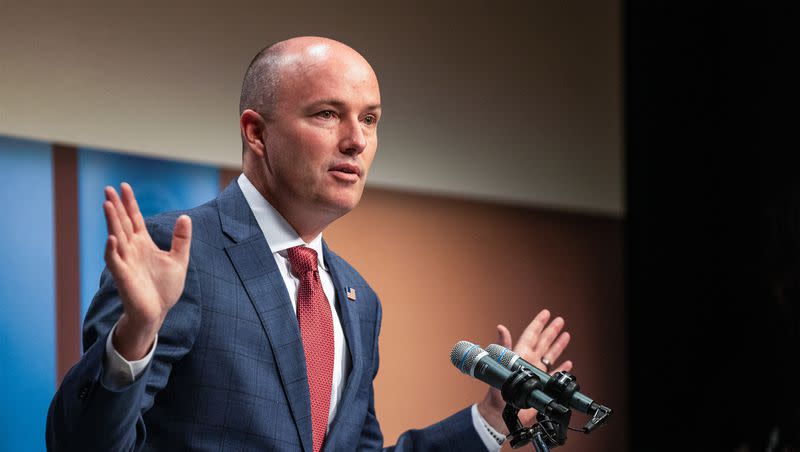Gov. Spencer Cox says Utah is prepared to defend social media laws amid suit

- Oops!Something went wrong.Please try again later.
On Wednesday, Gov. Spencer Cox addressed NetChoice’s lawsuit filed in the U.S. District Court for the District of Utah, challenging the Utah Social Media Regulation Act.
Expected to go into effect on March 1, 2024, the Utah House and Senate passed HB311 and SB152, which comprise the Utah Social Media Regulation Act. Among other tenets of the act, it requires social media companies to verify the age of Utah users who open or maintain accounts and creates a curfew from 10:30 p.m. to 6:30 a.m.
NetChoice’s suit challenges the Utah Social Media Regulation Act on First Amendment grounds and described the act as “an unconstitutional attempt to regulate both minors’ and adults’ access to — and ability to engage in — protected expression.”
Cox explained that since the suit is active, his ability to discuss it is minimal. “All I can say is that this was no surprise,” he said. “... We will vigorously defend these laws, we are prepared for it.”
The Utah attorney general’s office previously gave a statement to the Deseret News, which said, “The State of Utah is reviewing the lawsuit but remains intently focused on the goal of this legislation: Protecting young people from negative and harmful effects of social media use.”
Cox also referenced an article published in The Atlantic by Columbia Law professor Tim Wu. Wu’s article dealt with the decision in the NetChoice v. Bonta case, which struck down a California law dealing with children’s protections on the internet.
Related
In December 2022, NetChoice filed a suit naming the California attorney general as a defendant challenging the California Age-Appropriate Design Code Act on First and Fourth Amendment grounds. In September 2023, a judge granted a preliminary injunction. Wu’s article is critical of the judge’s decision.
“The decision is a nearly unreadable mess of jargon, showing how easily a judge can get lost in a professional bubble, become fixated on doctrinal details and forget that what she is doing is a misuse of the Constitution,” Wu wrote.
Cox called Wu’s piece “a great article” and later said that he anticipated the U.S. Supreme Court would eventually weigh in on laws like these.
A Deseret News/Hinckley Institute of Politics poll conducted this summer found that 79% of respondents either strongly agreed or somewhat agreed with Utah’s law requiring minors to obtain permission from a parent or guardian before joining social media platforms. Ten percent said they somewhat disagreed and 8% responded they strongly disagreed.
Leana S. Wen, contributing columnist for The Washington Post, praised Cox’s signing of this legislation in one of her columns.
“The point, though, is that the default setting should change from unregulated use of social media to careful parental oversight,” Wen wrote. “Utah’s bold efforts offer a road map for other states that are serious about addressing not just the manifestations of the teen mental health crisis but also a root cause of it.”
Critics of the legislation like Jason Kelley argue that the bills impede First Amendment rights and create “dangerous privacy invasions.”
“Social media’s toxicity is a real issue. But young people are not the only ones affected, and solutions that limit their rights in egregious ways are not solutions at all,” Kelley wrote in a post on Electronic Frontier Foundation. “Laws that insert the state into a family’s right to decide what level of independence a young person has, and block young people from accessing legal speech, will not solve the problems these complex social issues, which exist both online and offline.”
When speaking to The New York Times about why Cox has signed legislation like the the Utah Social Media Regulation Act, he said that after research, he’s found “there is a general consensus and acknowledgement that social media and access to these devices is causing harm. Significant harm.”
“If you look at the increased rates of depression, anxiety, self-harm since about 2012, across the board but especially with young women, we have just seen exponential increases in those mental health concerns,” Cox continued.
Since taking office, Cox has also launched a public awareness campaign about the harms of social media.
“Rates of depression, anxiety, loneliness, suicidal thoughts and behaviors have increased in recent years,” Cox said in a press release. “It’s undeniable that social media is harming our children’s mental and physical health, brain chemistry, self-esteem and more. Parents need to know about these dangers so they can best help their children and teens. We encourage all Utahns to consider less screen time and more human connection. Let’s disconnect to reconnect.”
Related

